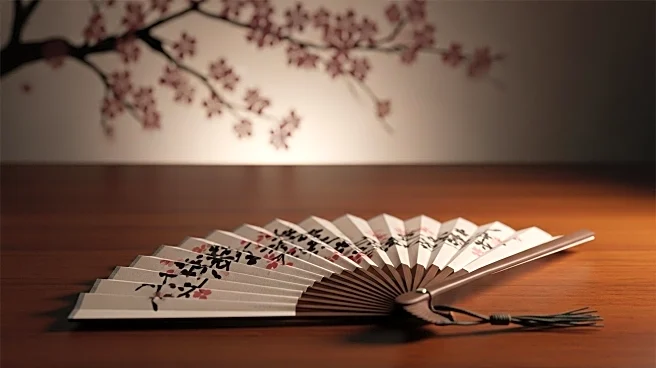What's Happening?
The Japanese government has formally requested OpenAI to cease activities that infringe on Japanese intellectual property, particularly through its video-generating tool, Sora 2. At a Cabinet Office press conference, Minister of State for IP and AI Strategy
Minoru Kiuchi emphasized the cultural significance of anime and manga, urging OpenAI to respect Japanese copyrights. Digital Minister Masaaki Taira suggested that Japan might invoke provisions under the AI Promotion Act if OpenAI does not comply voluntarily. Sora 2, launched on October 1, allows users to create 20-second HD videos, which have been used to generate content featuring copyrighted characters from popular franchises like One Piece and Pokemon. This has raised concerns among Japanese authorities and creatives, leading to the government's official request. The AI Promotion Act, effective since September 2025, encourages ethical AI use and cooperation with government guidelines, although it lacks specific penalties.
Why It's Important?
This development is significant as it highlights the ongoing global debate over AI and intellectual property rights. Japan's action underscores the importance of protecting cultural assets in the face of advancing technology. The request to OpenAI reflects broader concerns about AI's impact on creative industries, which are vital to Japan's economy and cultural identity. Major rights holders like Nintendo and Disney have already taken legal action against AI companies for unauthorized use of their characters, indicating potential legal challenges for OpenAI. The situation could influence global AI regulations, as Japan positions itself as a leader in rule-making around AI and intellectual property.
What's Next?
OpenAI CEO Sam Altman has acknowledged the concerns and promised greater control for rights holders, including the ability to restrict or block the use of specific characters. However, OpenAI has not yet issued an official response to the Japanese government's request. Legal experts warn that AI-generated videos featuring copyrighted figures pose serious risks of infringement, suggesting that OpenAI may face a wave of copyright lawsuits if the issue is not resolved. The situation may prompt further discussions on international AI regulations and intellectual property protections.
Beyond the Headlines
The controversy surrounding Sora 2 and AI-generated content raises ethical questions about the balance between technological innovation and cultural preservation. As AI tools become more sophisticated, the potential for misuse increases, challenging existing legal frameworks. This moment presents an opportunity for Japan to influence global standards in AI development, particularly in protecting cultural heritage. The case also highlights the need for international cooperation in establishing guidelines that ensure responsible AI use while fostering creativity.
















